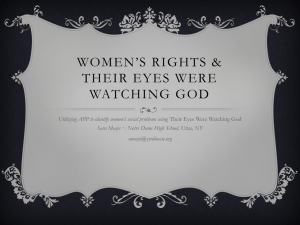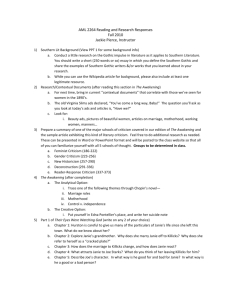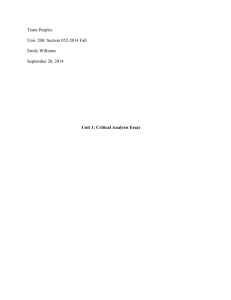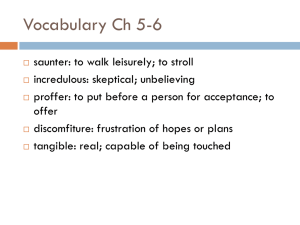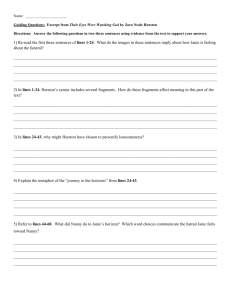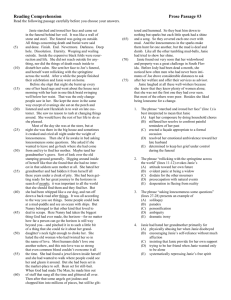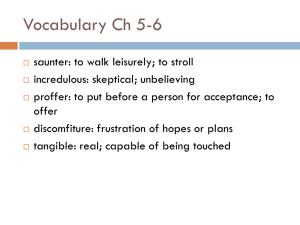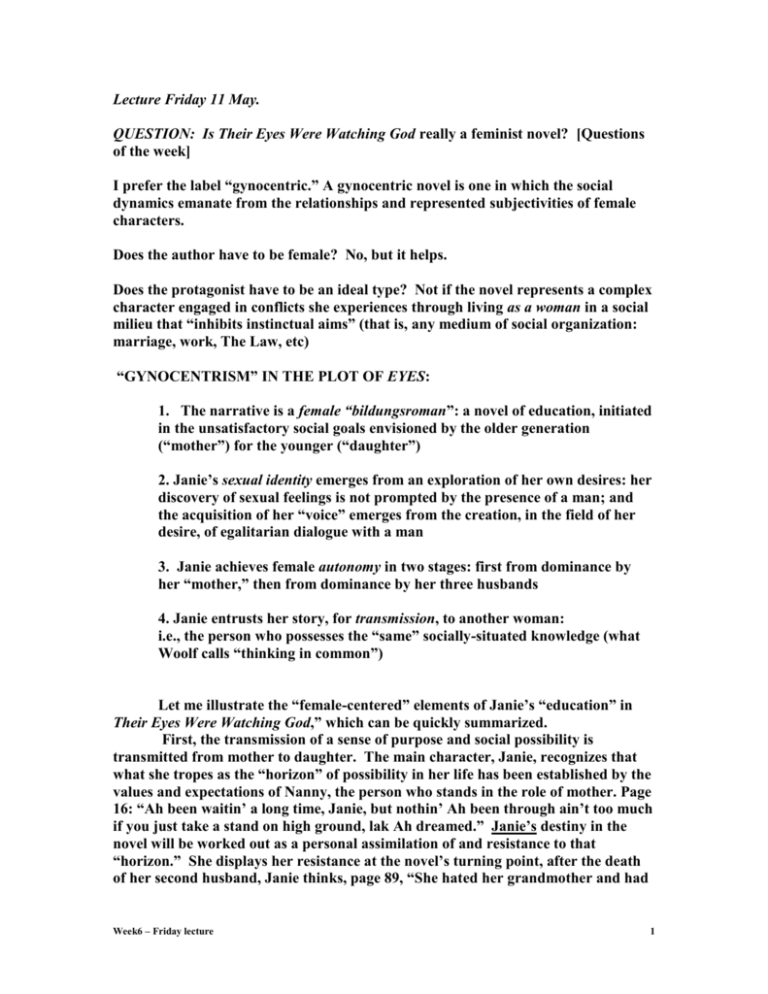
Lecture Friday 11 May.
QUESTION: Is Their Eyes Were Watching God really a feminist novel? [Questions
of the week]
I prefer the label “gynocentric.” A gynocentric novel is one in which the social
dynamics emanate from the relationships and represented subjectivities of female
characters.
Does the author have to be female? No, but it helps.
Does the protagonist have to be an ideal type? Not if the novel represents a complex
character engaged in conflicts she experiences through living as a woman in a social
milieu that “inhibits instinctual aims” (that is, any medium of social organization:
marriage, work, The Law, etc)
“GYNOCENTRISM” IN THE PLOT OF EYES:
1. The narrative is a female “bildungsroman”: a novel of education, initiated
in the unsatisfactory social goals envisioned by the older generation
(“mother”) for the younger (“daughter”)
2. Janie’s sexual identity emerges from an exploration of her own desires: her
discovery of sexual feelings is not prompted by the presence of a man; and
the acquisition of her “voice” emerges from the creation, in the field of her
desire, of egalitarian dialogue with a man
3. Janie achieves female autonomy in two stages: first from dominance by
her “mother,” then from dominance by her three husbands
4. Janie entrusts her story, for transmission, to another woman:
i.e., the person who possesses the “same” socially-situated knowledge (what
Woolf calls “thinking in common”)
Let me illustrate the “female-centered” elements of Janie’s “education” in
Their Eyes Were Watching God,” which can be quickly summarized.
First, the transmission of a sense of purpose and social possibility is
transmitted from mother to daughter. The main character, Janie, recognizes that
what she tropes as the “horizon” of possibility in her life has been established by the
values and expectations of Nanny, the person who stands in the role of mother. Page
16: “Ah been waitin’ a long time, Janie, but nothin’ Ah been through ain’t too much
if you just take a stand on high ground, lak Ah dreamed.” Janie’s destiny in the
novel will be worked out as a personal assimilation of and resistance to that
“horizon.” She displays her resistance at the novel’s turning point, after the death
of her second husband, Janie thinks, page 89, “She hated her grandmother and had
Week6 – Friday lecture
1
hidden it from herself all these years under a cloak of pity. She had been getting
ready for her great journey to the horizons in search of people;…but she had been
whipped like a cur dog and run off down a back road after things. …Nanny had
taken the biggest thing God ever made, the horizon…and pinched it in to such a
little bit of a thing that she could tie it about her daughter’s neck tight enough to
choke her.” Yet at the end of the novel, Janie is metaphorically standing on high
ground, as her Nanny dreamed she would. A woman of wealth and independent
status in her community, she mounts the stairs of her house and in the privacy of a
room of her own, “She pulled in her horizon like a great fish-net. Pulled it from
around the waist of the world and draped it over her shoulder. So much of life in its
meshes! She called in her soul to come and see.” [193]
When she makes that significant last gesture, Janie is standing in her
bedroom. That brings me to point two in my list of what makes this a gynocentric
novel: Janie is in possession of a sexual identity founded on the fulfillment of her
own desires. This, to me, is one of the most radical aspects of Hurston’s novel. She
explores, as few women writers had dared to do before her, the progress of a
woman’s sexual education. This is radical for several reasons. First, because the
phallocratic organization of society does not require that a woman should
experience pleasure in sex; quite the opposite. The ignorant virgin is the idealized
object of acquisition as a marriage partner, and she is expected to remain chaste
within marriage; her opposite number in society is the whore, whose sexual activity
again is based on economic need rather than on desire.
But Janie’s story begins with the awakening of desire in her body, the
awakening configured in the recurring image of the blossoming pear tree, pp. 1112]. Three points about this passage:
1) “[The blossoming tree] had called her to come and gaze on a mystery… It
connected itself with other vaguely felt matters that had struck her outside
observation and buried themselves in her flesh. Now they emerged and quested
about in her consciousness.” –This is a dramatization of the kind of thinking and
feeling that creates the trope, the coalescence of one thing with another that is
fundamental to literary thought.
2) “…the inaudible voice of it all came to her” – the power of the trope is
combination of what is interior with what is exterior.
3) “She saw a dust-bearing bee sink into the sanctum of a bloom…” –what
Janie “sees” is an externalization of her own genitalia as she experiences them: the
image is not phallic (penetration) but clitoral and vaginal. And the paragraph ends
with an experience for which Janie has no name, but for which the reader does have
a name: “Janie felt a pain remorseless and sweet that left her limp and languid.” —
We notice that Hurston uses the mode of indirect discourse to illuminate the
character’s subjectivity: the omniscient narrator knows this is an orgasm, but Janie
“knows” it with her body.
To summarize the role of these paragraphs in the plot of Their Eyes Were
Watching God: Janie recognizes this experience as an authentic wellspring of motivation
in her life. As Freud puts the case in Civilization & Its Discontents: “Genital love
provides the prototype of all happiness,” [56] and the quest for sexual knowledge is the
prototype for every kind of research. Hurston dramatizes this principle, in this scene.
Week6 – Friday lecture
2
Like Titania in a Midsummer Night’s Dream whose eyes have been enchanted by a magic
herb, Janie is besotted—she fastens her desire on the first creature who crosses her field
of vision. Thus does Janie’s sexual education begin. Nanny at once recognizes what has
happened— “youse got yo’ womanhood on yuh,” she observes— and quickly acts to
avert the danger she foresees in Janie’s quest for satisfaction: “’It ain’t Logan Killicks Ah
wants you to have, baby, it’s protection.’” [15] And thus does the mother figure, as
usual in novels, move to divert the energies of the daughter’s desire from self-fulfillment
into the socially-sanctioned role of wifehood, which is also to say, motherhood. Mothers
not only give birth to children of both sexes, mothers reproduce mothers.
Now, in many novels, this subversion of female desire results in romantic
torment in the heroine. In this novel, it strengthens the heroine’s determination to
act on the revelation she receives at age 16 about the nature of desire. Janie’s sexual
education in fact provides the novel with its entire plot. Each decisive action she
takes turns on her ability to correctly identify her desire. She leaves her first
husband after reaching an understanding that she does not desire him: “Nanny, Ah
wants to want him sometimes.”[23] Nanny’s answer is highly educational to Janie;
Nanny switches the terms of “want” from a sexual economy to a status economy: “If
you don’t want him, you sho oughta. Heah you is wid de onliest organ in town,
amongst colored folks, in yo’ parlor.” [23]
The next man who crosses Janie’s field of vision, Joe Starks, “did not
represent sun-up and pollen and blooming trees,” the narrator tells us, “but he
spoke for far horizon.” [29] Under the influence of his desire for her, and his vision
of a bigger life, Janie undergoes a transformation. Page 32: “What was she losing so
much time for? A feeling of sudden newness and change came over her. Janie
hurried out the front gate and turned south….” The span of Janie’s marriage to Joe
Starks covers twenty years, but her desire for him expires after seven of those years,
and the novel tells us why. Page 71: “He wanted her submission and he’d keep on
fighting until he felt he had it. So gradually, she pressed her teeth together and
learned to hush. The spirit of the marriage left the bedroom and took to living in
the parlor. …The bed was no longer a daisy-field for her and Joe to play in.”
What Janie has to learn from Joe is the same lesson Mrs. Ramsay has
learned from Mr. Ramsay: that a man’s masculinity requires incessant
maintenance; and that he must repeatedly display in public his right to dominate his
wife. Joe sets Janie up over everybody in town except himself, and requires her to
cover her beautiful hair. But chiefly and most significantly, he silences her. Joe’s
own desire is to possess a “big voice” [27-28] so his wife must not be permitted to
express herself. “Mah wife don’t know nothin’ ‘bout no speech-makin’. Ah never
married her for nothin’ lak dat. She’s uh woman and her place is in de home.’” [43]
And when Janie finally turns against Joe, it’s a speech that does him in. Page 79:
“’You big-bellies round here and put out a lot of brag, but tain’t nothin’ to it but yo’
big voice. Humph! Talkin’ bout me lookin’ old! When yo’ pull down yo’ britches,
yo’look lak de change uh life.’”
It is radical of Hurston to track the education of her heroine through a
sequence of sexual liaisons; to idealize a woman who is frankly motivated by her
sexual appetites, and who leaves a marriage without remorse or guilt, and who
apparently takes no interest whatsoever in motherhood. But most radical of all is
Week6 – Friday lecture
3
the way Hurston ’s treatment of Janie’s aging. In Hurston’s plot, Janie’s long
drawn-out sexual education is preparation for a consummation. Hurston signals
this in the scene that follows Joe’s death, page 87. Alone in the house with his
corpse, Janie recalls that “Years ago, she had told her girl self to wait for her in the
looking glass….Perhaps she’d better look. She went over to the dresser and looked
hard… The young girl was gone, but a handsome woman had taken her place. She
tore off the kerchief from her head and let down her plentiful hair.” Hair, in this
novel, once again, is a signifier of sexual allure, the instinctual vitality Janie gives off
from the very first pages of the novel, where even before we know her name we see
her through the eyes of men, page 2, who “noticed her firm buttocks like she had
grape fruits in her hip pockets” [and] “the great rope of black hair swinging to her
waist and unraveling in the wind like a plume …”
The stage is now set for Janie to meet the man who will not attempt to
dominate her: the man represented in the novel as Janie’s ideal partner. What sort
of man do we find idealized in this female-centered novel? What does a man have to
offer a mature woman who does not want to enter into a conventional heterosexual
relationship in which the man is in charge?
There are four answers. First: A man able to elicit the power of Janie’s witty
tongue, and tells Janie at their first meeting, “You got good meat on yo’ head” [96].
Then: A man able to revive Janie’s long-submerged desire: “Tea Cake
looked like the love-thoughts of women” [106]. He is delicious, the masculine
embodiment of the revelation she glimpsed at age 16. “He done taught me the
maiden language all over,” Janie tells her best girlfriend Pheoby [115]. Or, as Tea
Cake tells her on his death-bed, “God made it so you spent yo’ ole age first wid
somebody else, and saved up yo’ young girl days to spend wid me.” [180-181]
Third, Tea Cake is a man who wants to play with Janie, and leads her out of
confinement in the respectable roles her marriage had imposed on her. For Janie,
the way down is the path to freedom. When she has finally arrived in the
Everglades “muck” with Tea Cake and the other workers, Janie reflects on her
liberation. Page 134: “What if Eatonville could see her now in her blue denim
overalls and heavy shoes? The crowd of people around her and a dice game on her
floor! She was sorry for her friends back there and scornful of the others. The men
held big arguments here like they used to do on the store porch. Only here, she
could listen and laugh and even talk some herself if she wanted to. She got so she
could tell big stories herself from listening to the rest.”
In short: Janie’s relationship to Tea Cake is structured by give-and-take, by
dialogue. It represents the possibility of an egalitarian dyad of exchange within the
field of Janie’s desire. By this point in the novel Janie and Tea Cake together have
created a relationship that replaces her silence and his blows with the “civilized”
sublimation that is talk.
[SKIP THIS IN LECTURE: GO ON TO QUESTION 2, lecture page 5]
I want to complete my review of the gynocentric elements of the novel by looking at
how systematically Hurston structures the representation of dyadic relationships to
reflect gendered hierarchies, and how her novel idealizes equality.
Week6 – Friday lecture
4
C. Gendered relationships in TEWWG
Dominance-structured:
F/f: ex, Janie becomes a woman and Nanny wants to put her “on high
ground” [10-20]
M/f: ex. Joe arrives in Maitland; becoming Mayor, silences Janie [3443]
F/m: Janie talks back, emasculating Joe [78-80]
M/[m/f]: ex, mule “draggin’ out”: Mayor’s wife can’t go, “sisters” go
to applaud [60ff]
Egalitarian:
F&F: ex. Janie’s “kissn’-friend” [7] Pheoby “didn’t go in by the front
gate…she walked around the fence corner and went in the
intimate gate with her heaping plate of mulatto rice” [4]
“mah tongue is in mah friend’s mouf” [6]
F & M: ex, “new thoughts had tuh be thought and new words said”
[115]
M & F: ex, “They,” the chorus of judgmental voices in opening pages:
“It was mass cruelty…Words walking without masters,
walking
altogether like harmony in a song” [2]
“They hoped the answers were cruel and strange” [4]
II. QUESTION OF THE WEEK: DOES JANIE REALLY FIND HER VOICE?
Let’s examine the courtroom scene pp. 184-189. As I see it, this is the definitive moment
of Janie’s acquisition of autonomy as a woman. The issue is HOW TO MAKE TRUTH
OUT OF EXPERIENCE. Nobody does; but Janie speaks words that satisfy her desire to
represent herself.
What happens in this scene, that is salient to the problem of speaking truth to power:
1) Janie identifies with the (white) women.
Why? “Thinking in common,” ff
(“It would be nice if she could make them know how it was instead of those menfolks.”
185)
2) Janie’s version is disputed by the (black) spokesman.
Why? “Thinking in common” mm
(“they were there with their tongues cocked and loaded” 185)
Week6 – Friday lecture
5
3) The black spokesman is silenced by the (white) prosecuting attorney representing The
State.
Why? “Thinking in common,” wmwm
(“another word out of you …and I’ll bind you over to the big court” 187)
4) Janie is declared innocent by the (white) Law, for the wrong reason.
Why? “Thinking in common,” wmwm
( “…she is a poor broken creature,” they argue; but the indirect discourse tells us Janie
has reasoned with a sense of agency, retaining her composure: “She made them see…she
didn’t plead” 187)
5) Janie is declared guilty of being female by the (black) men.
Why? The men don’t recognize that she has been “put down” too: they disown
commonality of (same with her) race in asserting (different from her) gender solidarity.
(One unidentified man speaks, and she overhears: “Well, you know whut dey say ‘uh
white man and uh nigger woman is de freest thing on earth.’” 189)
Week6 – Friday lecture
6

